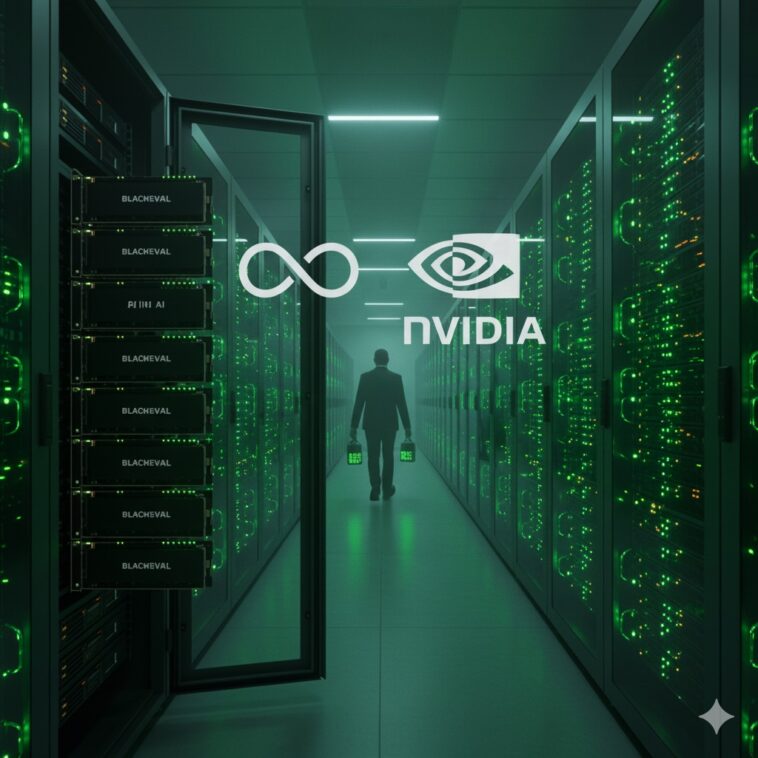The race for AI computing power is heating up, and there’s no sign of it slowing down. Shares of CoreWeave, a specialized data center operator backed by Nvidia, jumped over 14% on Tuesday, thanks to buzz about a massive new deal with Meta Platforms. This reported $14.2 billion contract would allow CoreWeave to provide Meta with essential access to Nvidia’s premium GB300 server racks, which are loaded with 72 of the company’s highly sought-after Blackwell AI GPUs.
A $14 billion check just for server access? That’s an eye-popping amount that highlights the intense, high-stakes rivalry among Big Tech firms as they race to build the infrastructure necessary for their next-gen AI models. CoreWeave, which has found a profitable niche by offering access to large supplies of Nvidia’s coveted chips, seems to be the star of the show.
The AI Arms Race: Securing Nvidia’s Supply
This recent agreement with Meta comes right on the heels of another huge deal from just last week: a whopping $6.5 billion contract with OpenAI. For CoreWeave, under the leadership of CEO Michael Intrator, these new partnerships mark a significant strategic shift. The company has been laser-focused on diversifying its client base, moving away from its heavy dependence on Microsoft, which made up about 70% of its revenue in the last quarter.
“This is definitely a step in the right direction for diversification,” Intrator reportedly shared with Bloomberg, highlighting the company’s push to expand its customer base. And he’s right. Relying on a single massive client, especially one that also competes with you, is like walking a tightrope.
The fact that Meta is back for a deal of this scale with CoreWeave says a lot. The social media giant is investing at a breakneck speed. Just look at their capital expenditure: Meta has raised its 2025 forecast to between $66 billion and $72 billion, all to fund projects like their enormous 4 million-square-foot data center complex currently under construction in Louisiana. They’re spending money like it’s going out of style to either catch up or stay ahead in the AI race.
Demand for Compute Capacity: Is it ‘Limitless’?
The recent surge in AI infrastructure deals is enough to make anyone’s head spin. Just look at Nvidia’s jaw-dropping $100 billion investment in OpenAI, or the rumored $300 billion contract OpenAI has with Oracle. It’s like a gold rush for computing power! Citi analysts are trying to wrap their heads around it all and predict that total AI capital spending from 2025 to 2029 could soar to an astonishing $2.8 trillion.
Even some analysts who typically bet against the market are starting to recognize the momentum. Felix Wang, a hedge risk management analyst at Hedgeye, who has a short position on CoreWeave, described the latest deal as “a positive surprise.”
On the flip side, the optimists are seeing a fundamental, long-term transformation. “This is a win-win for both companies, and it clearly shows that the demand for high-end AI chips is practically endless,” said Kimberly Forrest, CIO of Bokeh Capital Partners, in a recent interview. “It’s reminiscent of the early internet days, but instead of laying down fiber optic cables, they’re stacking GPUs. Everyone wants a piece of the action, and they want it right now.”
The CoreWeave Conundrum: Debt and Competition
Despite the impressive stock surge—CoreWeave shares have skyrocketed by about 260% this year—the company’s path has been anything but straightforward. Their public offering back in March faced some bumps, and there are still worries floating around on Wall Street.
The main issue, the big elephant in the room, revolves around CoreWeave’s core business model. The company has taken on a hefty amount of debt at steep interest rates to fund its extensive inventory of Nvidia chips. Meanwhile, their clients, the tech titans, are busy constructing their own massive data centers. The concern is pretty clear: once Meta, Microsoft, and Google finish building their facilities and secure a steady supply of Nvidia’s prized chips, they might just cut ties. CoreWeave’s reason for being—serving as a temporary compute host while the big players build—could disappear.
It’s a risky balancing act, no doubt.
However, as long as the demand for immediate, cutting-edge compute power exceeds the supply—a situation that seems likely to persist for years—CoreWeave will continue to be a vital link in the chain. Their latest deal indicates that, for the time being, the urgency to grab immediate hardware is outweighing the long-term risks of depending on a third party.
Looking Ahead
Looking ahead, the competition to train and roll out cutting-edge AI models is set to keep fueling the need for specialized infrastructure. The deal with Meta not only brings in revenue but also serves as a significant endorsement of CoreWeave’s position in the ecosystem. The big question for investors is whether the company can maintain this momentum and turn its short-term tactical edge into a solid, long-lasting business before its powerful clients find alternatives.



